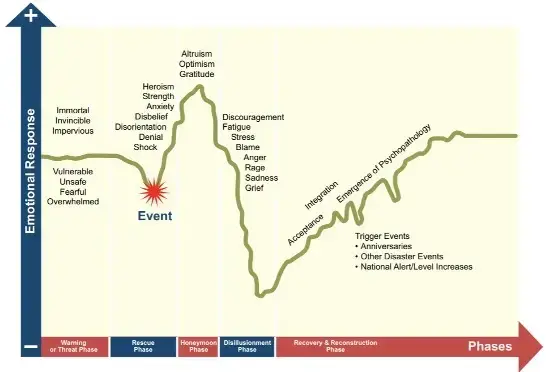By: Stephen Nichols, MD, Chief Clinical Innovation Officer and Chief Medical Officer for Virtual Clinical Services
Hurricane Disaster Fatigue
The subject was raised by SCP Health’s (SCP’s) Chief Medical Officer, Dr. Schillinger, during a meeting the day before Hurricane Delta was forecasted to strike Louisiana. Several team members on the call were preparing or had already prepared, for the second hurricane to hit the state in six weeks. They had also been “in the cone” for Marco and a few other tropical storms.
Now, Hurricane Delta has come and gone—leaving behind a fair amount of damage. Although power came back before too long for most, the internet remained iffy and intermittent, everyone I’ve spoken with from SCP is grateful and doing what needs to be done. One person in particular was thankful that an old oak tree that needed to be cut down fell and missed their house. Good luck and positive outcomes can happen during a disaster. And yes, there’s an ICD-10 code modifier for hurricanes (X37.0).
In addition to the pandemic and other disasters taking place, people remain resilient. As a result of major traumatic events, personal disasters occur seemingly in spite of the larger ones even when they are not a direct result of them. So, I’m going to provide insight into disasters and recovery.
5 Phases of Recovery
Disaster fatigue and recovery has been studied with phases defined for the experiences generally shared by those affected. Here are the five phases of disaster:
- Threat (perceived or not, with or without warning)
- Rescue
- Honeymoon
- Disillusionment
- Recovery
Here is a visual representation of disaster fatigue and recovery, thanks to the University of Rochester Medical Center:

Threat Phase
Hurricanes come with warnings, often they are just that—warnings without consequences. Some people become inured and may even seem cavalier. Perhaps, it simply reflects something in their personal philosophies. It seems as if it bothered them enough, they would move, but that’s not always true. For example, I ate at a pretty good Cajun restaurant on my way out on the interstate in West Texas that was run by someone who left New Orleans after going through Katrina. However, this is not about alert fatigue. Although a real thing and part of the disaster response of individuals and communities, it is not the focus of this article.
The pandemic affecting us today had early warning signs for several years. Conferences were held and we saw news releases on it over decades. We even had a “serious storm” with the H1N1 pandemic about a decade ago, but that did not have the major impact COVID-19 has had (unless you were directly affected by a personal tragedy from it).
Rescue and Honeymoon Phases
Usually with disasters, an event occurs, people heroically respond and good will expands. Although in some instances, people become overwhelmed, and others attempt to profit unscrupulously from the situation. In general, the best of humanity rises above during the rescue and honeymoon phases when there is an outpouring promise of assistance.
Disillusionment and Recovery Phases
The disillusionment phase occurs when discouragement develops as the reality of the scope and magnitude of the disaster recovery becomes apparent and return to normalcy is delayed. This is followed by the recovery phase which includes rebuilding and reconstruction, and reconsideration of priorities—both personal and communal.
Hurricanes usually have a longer recovery time between them, but unfortunately, that is not how it played out this year. The latter phases of the first disaster are blending with the phases of the second one. COVID-19 is impacting the country in a similar way—some places are getting hit repetitively, while other areas are just now feeling the impact. COVID-19 is dispersed, timing is variable, therefore, affecting people like a bunch of disasters. Different areas are in different disaster phases, which creates additional stress for Americans, negatively impacting everyone in some way or another.
Disasters can affect us physically, emotionally, cognitively, mentally, behaviorally, and/or spiritually. They can impact people in different ways at different times and not everyone moves through the phases in a straightforward manner, much like the stages of grief. There is a common progression, but it is not essential. The important part of this piece is simply to generate awareness of this framework to help us help each other and get through this.
3 Tips for Handling Disaster Fatigue
So, what can we do about it and how can it help? I recommend focusing on these three things:
- Recognize the phases and understand we may all be in a different one.
- Take care of ourselves so we can take care of other things.
- Identify problems we can fix.
Recognize the phases and understand we may all be in a different one
This first point provides a reference for discussions with one another. It can serve as a jumping off point for conversations, especially with those who may have never personally experienced a disastrous event before.
Take care of ourselves so we can take care of other things
The second point provides some of the oldest wisdom available: know thyself, be honest with yourself, and identify what you can do for yourself. Remember to address the following:
- Your physical state
- Your emotional state
- Your mental state
- Your spiritual state
It is important to address these with yourself and your loved ones.
Identify problems we can fix
This third point addresses what we can do to help improve the situation we are in, while focusing on things we can actually change or influence and make a real difference. This requires wisdom—the wisdom to recognize the difference between the things we can change and those we cannot.
Napping and Sitting
Finally, I’d like to close with some simple advice about napping and sitting. The military is again touting the importance of strategic napping or “field napping.” Napping does not work for everyone, but if you haven’t tried, I second the recommendation of the army. Think of it this way, which I read from a soldier’s account from his time in the field: if you are standing and can sit, sit; if you are sitting and can lie down, lie down; and if you are lying down and can nap, then nap.
Our approach to sleep marks the difference between childhood and adulthood. Children hate to nap, will actively fight it and must be forced to do so. Adults welcome napping until old age. A good nap is 15 to 20 minutes. A great one, or siesta is 80 to 100 minutes. Again, learn about yourself and find what works best for you.
A contrarian point to end this article on, one that is very pertinent for our modern world: if you are sitting for more than twenty minutes or so, you should get up and move around for all the inherently obvious reasons.
Take care, hang in there, and thanks for all you do.
Related Resources:
How to Protect Yourself Emotionally When Disaster Strikes
7 Tips to Prepare Your Hospital Before, During, and After a Hurricane Strikes
COVID-19 Reports: How SCP Partners are Responding to the Pandemic
Healing Warriors: Stories from the Front Lines of COVID-19






